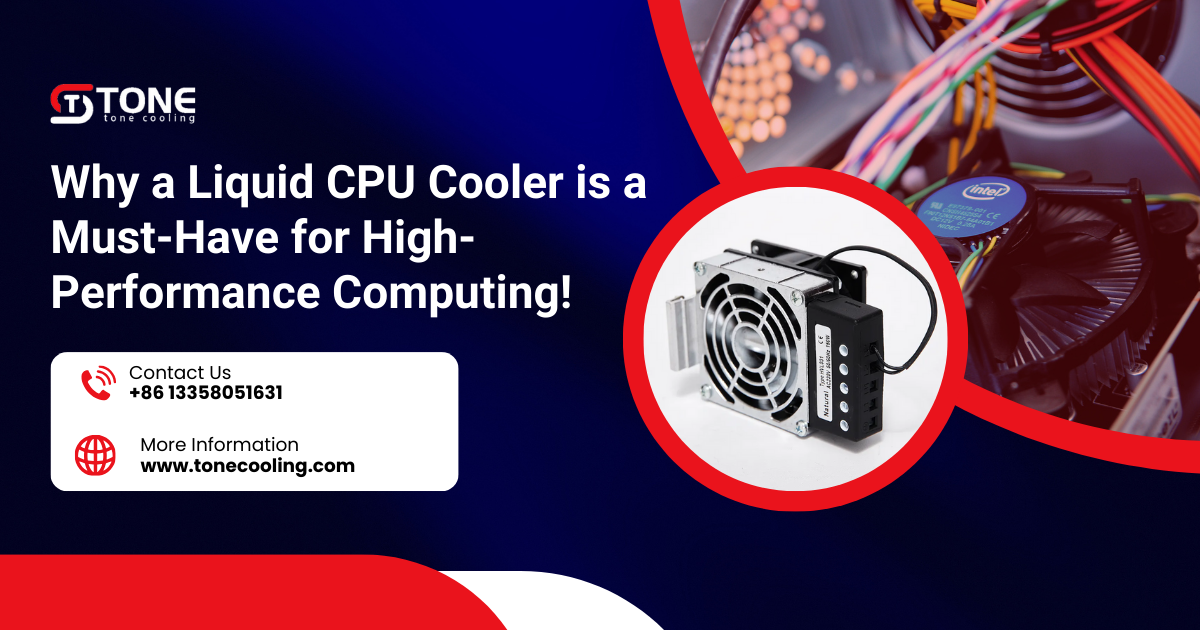
In the fast-paced world of high-performance computing, every component of your system plays a pivotal role in ensuring optimal performance. Whether you’re a gamer, content creator, or a professional running demanding applications, keeping your system cool is more crucial than ever. One of the most important factors in maintaining the stability and longevity of your computer is the cooling system, particularly the cooling of the CPU, which is the heart of your system. If you’re looking to boost your computer’s performance and prevent overheating, a Liquid CPU Cooler is no longer an optional upgrade—it’s a necessity.
A Liquid CPU Cooler is specifically designed to regulate the temperature of your CPU, preventing it from reaching dangerous levels that could cause throttling, instability, or even permanent damage. As CPUs become increasingly powerful, they generate more heat during intensive tasks like gaming, video rendering, or data processing. While traditional air coolers are often sufficient for basic usage, they fall short when it comes to handling the heat produced by modern, high-performance CPUs. This is where liquid cooling systems step in, offering superior heat dissipation and ensuring your CPU operates at its peak potential.
What Is a Liquid CPU Cooler?
Before diving into why a Liquid CPU Cooler is so crucial, it’s important to first understand what it is and how it works. A Liquid CPU Cooler consists of several key components that work together to dissipate the heat generated by the CPU during operation:
- Water Block: The water block sits directly on top of the CPU and acts as the interface between the CPU and the cooling system. It absorbs the heat from the CPU and transfers it to the coolant.
- Pump: The pump circulates the coolant through the system, moving it from the water block to the radiator.
- Coolant: The coolant absorbs heat from the CPU and carries it through the system. The coolant used in liquid cooling systems is typically a mixture of water and other substances that enhance heat transfer.
- Radiator: The radiator is where the coolant releases the absorbed heat. It usually has multiple thin fins and is paired with fans to increase the surface area for heat dissipation.
- Fans: The fans are attached to the radiator and help push cool air through the fins to expel the heat from the coolant.
In essence, a Liquid CPU Cooler uses liquid coolant to absorb and carry away the heat generated by the CPU. This process is far more efficient than air cooling, allowing the CPU to operate at higher speeds without reaching dangerously high temperatures.
The Importance of Cooling in High-Performance Systems
As computers continue to evolve, especially with the rise of gaming, 3D rendering, scientific simulations, and artificial intelligence applications, the demand for high-performance CPUs has increased. With greater performance comes greater power consumption, and ultimately, more heat. Excessive heat is one of the leading causes of performance throttling, instability, and even hardware damage.
In high-performance computing, heat management becomes even more critical. For instance, overclocking, which is the process of running a CPU at higher speeds than its factory settings, generates significantly more heat. In such cases, a Liquid CPU Cooler is indispensable to keep temperatures under control. Overheating not only impacts performance but can also shorten the lifespan of your CPU and other components, making effective cooling crucial for long-term reliability.
The reality is that air cooling, while adequate for many systems, struggles to keep up with the demands of modern, power-hungry CPUs. As such, liquid cooling systems, particularly Liquid CPU Coolers, have become the go-to solution for those looking to maintain optimal performance in the most demanding environments.
Why a Liquid CPU Cooler is Essential for High-Performance Computing
Now that we understand what a Liquid CPU Cooler is and why cooling is essential for high-performance computing, let’s delve into the specific reasons why these coolers are a must-have for anyone serious about performance.
1. Superior Heat Dissipation
One of the primary advantages of a Liquid CPU Cooler over traditional air cooling systems is its superior ability to dissipate heat. Liquid has a much higher heat capacity than air, meaning it can absorb and carry away more heat in a shorter amount of time. This is particularly important for modern CPUs, which generate significant heat during high-performance tasks like gaming, video editing, and overclocking.
With a Liquid CPU Cooler, the heat generated by the CPU is efficiently transferred to the coolant, which then carries it away to the radiator. The fans on the radiator help expel the heat, ensuring that the CPU remains at a stable temperature, even during heavy workloads. This allows the CPU to operate at peak performance without risking overheating.
2. Increased Overclocking Potential
For those who push their systems to the limit through overclocking, a Liquid CPU Cooler is essential. Overclocking increases the voltage and frequency of the CPU, which in turn generates more heat. This extra heat must be managed to maintain system stability and prevent thermal throttling, where the CPU automatically slows down to prevent overheating.
Traditional air coolers often struggle to keep up with the increased heat from overclocking, but a Liquid CPU Cooler can handle this heat more effectively. By maintaining lower temperatures, liquid cooling allows for more aggressive overclocking, resulting in higher CPU performance without compromising stability.
3. Quieter Operation
Air cooling systems rely on large fans to dissipate heat, and these fans can become noisy, especially under load. On the other hand, Liquid CPU Coolers are often much quieter, as they use larger fans on the radiator that can operate at lower speeds, reducing noise levels. The pump in a liquid cooler is also generally quieter than the high-speed fans used in air cooling systems.
For those who value a quiet working or gaming environment, a Liquid CPU Cooler offers a significant reduction in noise, allowing you to focus on your tasks without the distraction of loud fans.
4. Improved CPU Longevity
Excessive heat is one of the leading causes of CPU degradation over time. When a CPU operates at high temperatures for prolonged periods, the components inside can start to break down, leading to reduced performance and potentially permanent damage. By maintaining a stable temperature, a Liquid CPU Cooler helps protect the CPU from the damaging effects of heat, thereby extending its lifespan.
In high-performance systems, where CPUs are under constant heavy load, liquid cooling plays a crucial role in preventing thermal damage and ensuring the longevity of the system.
5. Compact Design and Aesthetics
Unlike bulky air coolers, Liquid CPU Coolers can be more compact, as the radiator can be mounted in various positions within the case, such as the top, bottom, or rear. This design flexibility allows for better airflow and more space around the CPU, improving overall system cooling.
In addition to their practical benefits, Liquid CPU Coolers often feature sleek and modern designs, with options for customizable RGB lighting. This allows users to enhance the aesthetics of their system while enjoying superior cooling performance. For PC enthusiasts who value both form and function, liquid cooling provides a visually appealing and efficient solution.
How to Choose the Right Liquid CPU Cooler
Choosing the right Liquid CPU Cooler depends on several factors, including your system requirements, the type of work or gaming you do, and your budget. Here are some key considerations when selecting a liquid cooler:
- Radiator Size: The size of the radiator determines how much heat it can dissipate. Larger radiators (240mm, 360mm) provide better cooling performance but may require more space in your case. Smaller radiators (120mm, 140mm) are more compact but may not offer the same level of cooling.
- Compatibility: Ensure that the cooler is compatible with your CPU socket and your PC case. Some coolers are designed specifically for certain sockets, while others come with mounting kits for a wide range of CPUs.
- Cooling Capacity: If you’re overclocking or using your system for demanding tasks, you’ll need a cooler with a higher cooling capacity. Look for coolers with larger radiators and high-performance fans.
- Noise Levels: If a quiet system is important to you, choose a cooler with a low-noise pump and fans. Many modern Liquid CPU Coolers offer silent operation even under load.
- Budget: While liquid cooling is often more expensive than air cooling, there are options available for every budget. A high-quality cooler may have a higher initial cost but can provide better long-term value by extending the life of your components.
A Liquid CPU Cooler is no longer an optional accessory for high-performance computing—it’s an essential component for anyone looking to get the most out of their system. Whether you’re gaming, creating content, or running resource-intensive applications, liquid cooling offers superior heat dissipation, quieter operation, and improved overclocking potential.
At Tone Cooling Technology Co., Ltd., we are committed to providing state-of-the-art cooling solutions, including high-performance Liquid CPU Coolers, that keep your system running at its best. By investing in a Liquid CPU Cooler, you can ensure that your CPU operates at peak performance, remains cool under heavy loads, and lasts for years to come.

